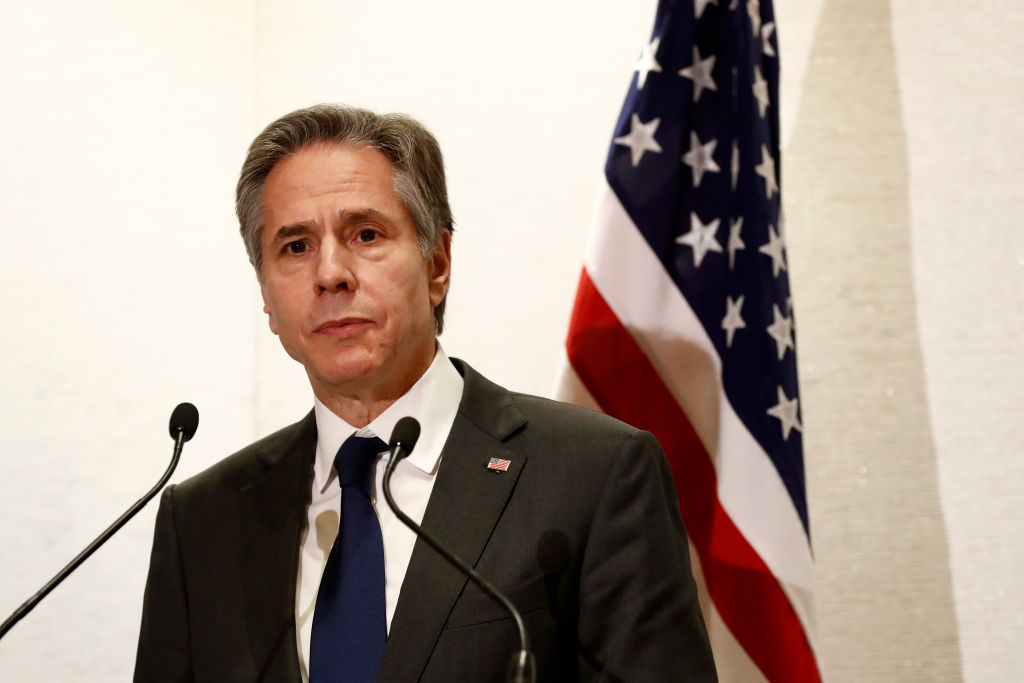China has slammed the door on restoring direct communications between the Chinese and U.S. militaries, Secretary of State Antony Blinken told reporters Monday.
China severed the communications connection between its military and America’s defense forces in August after former House Speaker Nancy Pelosi visited Taiwan.
On Monday, Blinken said during meetings with President Xi Jinping and other Chinese officials he asked them to restore that connection but was rebuffed.
“With regard to crisis communications and military-to-military channels, this is also something that I raised repeatedly during this trip,” President Joe Biden’s secretary of state said during a news conference at the end of his trip.
“I think it’s absolutely vital that we have these kinds of communications, military to military. That imperative, I think, was only underscored by recent incidents that we saw in the air and on the seas,” Blinken said.
“At this moment, China has not agreed to move forward with that,” he said. “I think that’s an issue that we have to keep working on. It is very important that we restore those channels.”
“So this is something that we’re going to keep working on,” the secretary of state said. “And, as I said, there’s no immediate progress, but it is a continuing priority for us.”
[firefly_embed]
[/firefly_embed]
A State Department news release on Blinken’s meetings with Chinese leaders said he had “candid, substantive, and constructive discussions on key priorities in the bilateral relationship and on a range of global and regional issues.”
“The Secretary emphasized the importance of maintaining open channels of communication across the full range of issues to reduce the risk of miscalculation,” the release said. “He made clear that while we will compete vigorously, the United States will responsibly manage that competition so that the relationship does not veer into conflict.”
The news release said Blinken “reiterated there has been no change to the U.S. one-China policy.”
The one-China policy is the official diplomatic position that the United States officially recognizes China but not Taiwan, despite its unofficial support for the self-governing island China believes should be part of China.
US Secretary of State Antony Blinken says he raised concerns about China’s “provocative actions” in the Taiwan Strait during talks in Beijing
Is China a threat to U.S. national security?“We do not support Taiwan independence,” he adds https://t.co/q5LVRjYhbL pic.twitter.com/ioj8JnH3th
— Bloomberg (@business) June 19, 2023
Wang Yi, China’s top foreign policy official, upbraided Blinken over American policy, according to The New York Times.
Wang accused the United States of “hyping” the “China threat theory,” according to a Chinese government readout of his meeting with Blinken.
He said the U.S. was “recklessly interfering in China’s internal affairs” on issues such as Taiwan, which is supplied with high-tech weapons by the United States.
CBS News reported that Wang told Blinken “China has no room to compromise or concede” on Taiwan.
Continuing important face to face diplomacy in Beijing, I met today with Central Foreign Affairs Office Director Wang Yi for discussions on a range of bilateral and global issues that affect people at home and around the world. pic.twitter.com/yXYcfU0Go1
— Secretary Antony Blinken (@SecBlinken) June 19, 2023
China’s Ministry of Foreign Affairs said in a statement that Blinken’s trip there “coincides with a critical juncture in China-U.S. relations, and it is necessary to make a choice between dialogue or confrontation, cooperation or conflict.”
“The United States must … respect China’s sovereignty and territorial integrity and clearly oppose ‘Taiwan independence,'” the statement said.
This article appeared originally on The Western Journal.

























 Continue with Google
Continue with Google